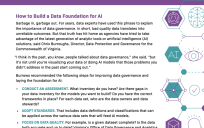Government agencies are facing the challenge of providing citizens with the information they need in a clear, concise, and easily accessible manner. Today’s constituents want the opportunity to self-serve, and while you already might have developed the critical content and knowledge they need, constituents still spend too much time navigating your site, unable to find the answers they seek. That ultimately makes it necessary for them to call your support line.

Why? Two reasons:
1. some of the information on your site is unclear and
2. your current search tools fail to directly answer users’ questions from the rich content you’ve developed
On a large website with a lot of articles or web pages, you might have inconsistent or duplicate content with conflicting information. You might also be missing some information, but how can you tell? Existing keyword searches or chatbots don’t help. Keywords like “drivers license” or “construction permits” don’t provide any insight into the detailed information that constituents really want to know. Chatbots and intelligent virtual assistants (IVAs) frequently fail to interpret user questions and locate the correct answers to those specific questions from your knowledge base.
While there are some emerging technologies that try to address these issues, one, in particular, is making headway. Generative AI (GenAI) answer engines offer a revolutionary approach to addressing this information gap. These advanced systems have the ability to comprehend user queries, identify common themes, and generate question/answer pairs and relevant suggestions for content enhancement.
Understanding the Information You Already Have
The first step is to use the information you may already have to better understand what the customer really wants and needs. Answer engines automatically cluster similar items from your existing query history together, eliminating the manual process of scanning thousands of lines in a spreadsheet to create a list of the most important subjects. This process reveals important topics that are requested in multiple and/or different ways that are difficult to discern through manual analysis. Content creators can leverage the answer engine to generate new content or edit existing materials to address any gaps. As an added benefit, the answer engine can provide a validated answer to a cluster of questions as a stopgap for all subsequent users, even when the content is updated over time.
The next step is to encourage end users to type in full-sentence questions, which improves the performance of an answer engine and is more likely to return accurate and relevant results. It also captures more detailed insight about the users’ needs.
In contrast, a keyword-based solution can only capture individual words from the user, which often miss the true intent of the original question. To simplify the user experience, answer engines can automatically generate questions that your existing content can answer, while revealing the most relevant of these questions as users start to type. The user can select one of the suggested full-sentence questions or continue to type their actual one if there isn’t a match.
Answer engines increase the odds that regardless of how the user phrases their question, they will receive a highly relevant answer 80% of the time with just one click. Government agencies will start to see much more detailed information on what users want to know along with suggested content for new and novel questions.
Advanced Analytics
Next, the answer engine can provide advanced analytics, indicating how well individual clusters of questions are being answered. These analytics offer several insights. To start, they score the performance of the platform on each user question to enable content creators to focus on the questions that are not being correctly answered. It also allows end users to indicate the effectiveness of the answer and provide feedback for poor performance to enable content creators to target their efforts. As an added benefit, the answer engine uses Generative AI to suggest content based on the entire body of existing content to make the content creator more efficient.
Summary
The adoption of answer engines marks a significant shift from traditional models of government-citizen interaction. Proactive engagement and user-centered design become the driving forces behind this evolution. Agencies can stop guessing what specific information they need to provide their constituents and can more efficiently and effectively create content tailored to peoples’ needs. This substantially reduces the number of support calls. By embracing these AI-powered tools, government agencies can empower citizens, enhance service delivery, and forge a path toward a more informed and engaged society.
Ryan Welsh is the founder and CEO of Kyndi, a global provider of the Kyndi Platform for the Natural-Language-Enabled Enterprise, an AI-powered platform that empowers people to do their most meaningful work. To learn more visit https://kyndi.com/ or follow them on LinkedIn and Twitter.





Leave a Reply
You must be logged in to post a comment.